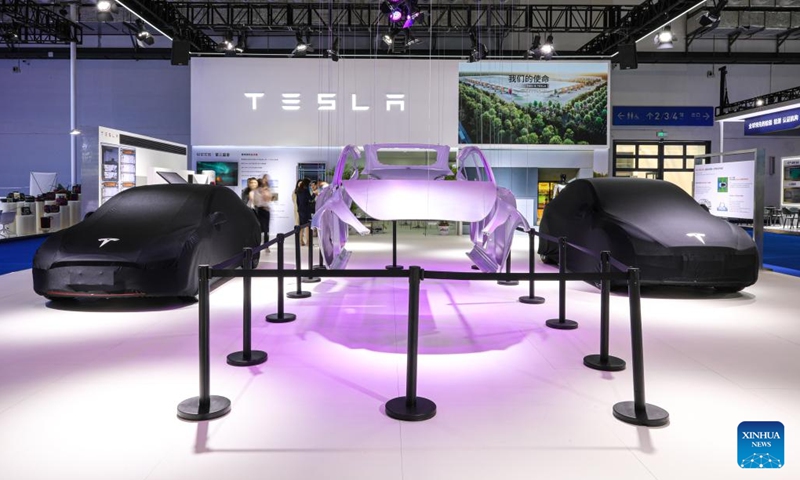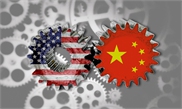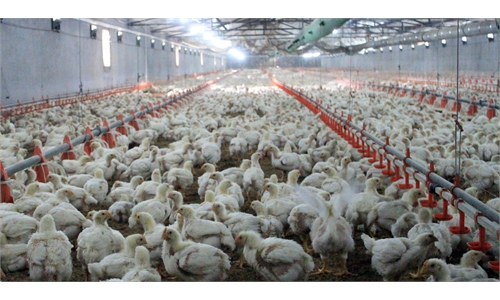
This photo taken on April 10, 2023 shows the booth of Tesla at the third China International Consumer Products Expo (CICPE) in Haikou, capital city of south China's Hainan Province. More than 3,300 high-quality brands from home and abroad have gathered at the third CICPE, which kicked off Monday in Haikou. Photo: Xinhua
The Chinese market has become a growth engine for multiple US companies, as seen from their financial performances in the first quarter of 2023. Analysts attributed this scenario to the solid economic recovery of China, which has boosted both industry demand and consumption.
As one of the latest examples, Coca-Cola Co said its growth in developing and emerging markets was led by China, India and Brazil. Its coffee unit grew 9 percent, primarily driven by the strong performance of Costa coffee in the UK and China.
Coca-Cola reported a 5 percent year-on-year growth in net revenues in the first quarter of 2023, reaching $11.0 billion, beating market expectations, according to the company's financial results released on Monday.
According to Tesla's results submitted to the US Securities and Exchange Commission on Monday, its revenues in China hit $4.89 billion in the first quarter, increasing by 5.18 percent year-on-year, and contributing to nearly 21 percent of its total revenue. Tesla's sales in the Chinese mainland market accounted for more than 32 percent of its global deliveries of 422,875 vehicles.
For Lam Research Corp, an American supplier of wafer fabrication equipment and related services to the semiconductor industry, the Chinese mainland contributed 22 percent of its total revenue in the first quarter, according to its results released on April 19.
Generally weak demand from memory integrated circuit makers "was partially offset by China-related demand across logic and memory," Lam Research said in the financial results.
The remarkable performance of multiple US companies was backed by China's reviving economy, Gao Lingyun, an expert at the Chinese Academy of Social Sciences in Beijing, told the Global Times on Tuesday.
Other analysts said that most US-based consumer goods companies have long-term investments in China and are integrated with China's dual circulation and supply chains.
China is the most important consumer market in the Asia-Pacific region and a major single market in the world. The economic recovery in the first quarter of 2023 presented a golden opportunity for many foreign companies, Zhang Yi, CEO of the iiMedia Research Institute, told the Global Times on Tuesday.
China's GDP expanded 4.5 percent year-on-year to 28.5 trillion yuan ($4.15 trillion) in the first quarter, official data showed.
China's household savings balance is more than 110 trillion yuan, which is an important basis for strong consumption, Zhang noted.
Analysts stressed that US companies' performance, especially in the Chinese market, reflected China's efforts to further open up, which was proved by the increasing openness, transparency and improvement of the Chinese market. China has always stressed that it will unswervingly expand opening-up and share its development opportunities with the wider world.
However, in contrast to the Chinese market's support to US companies, the continuous US suppression of Chinese enterprises has hampered their normal operations in the US and also in global markets, Chen Jia, an independent analyst on global strategy, told the Global Times on Tuesday.
Such a stark contrast of the business environment can be clearly manifested in the big welcome Apple CEO Tim Cook received when he visited China compared with TikTok CEO Shou Zi Chew's five-hour grilling by US lawmakers, which happened almost simultaneously.
"We treat all companies as equals and have the same entry rules to foster a sound environment for market competition," Zhang stressed. "The unilateral protectionism carried out by the US will certainly not have a positive impact on its own economic growth."
The US-launched technology war and trade war at the industry chain level will disrupt the global division of labor and supply chains, and it will also force US-based companies to choose between "political correctness" and business operations, said Chen.



